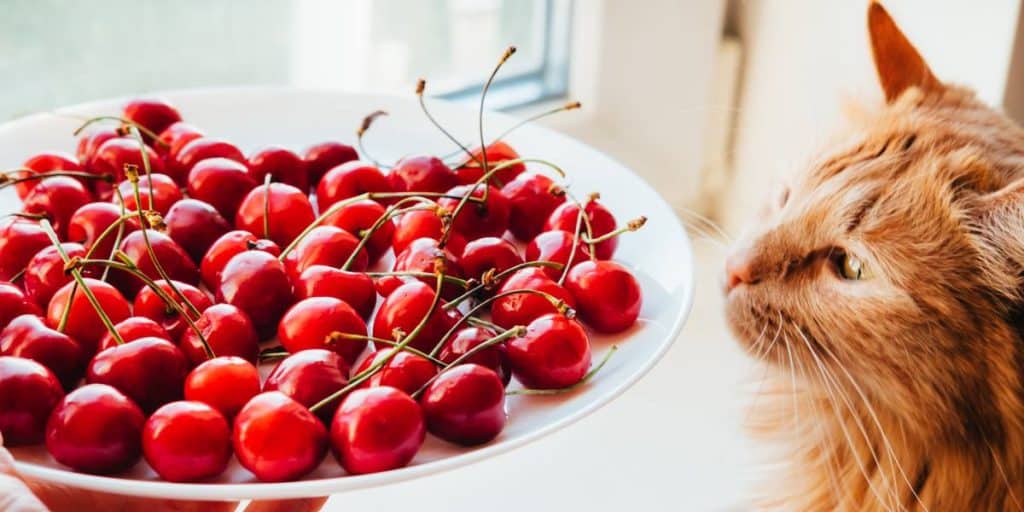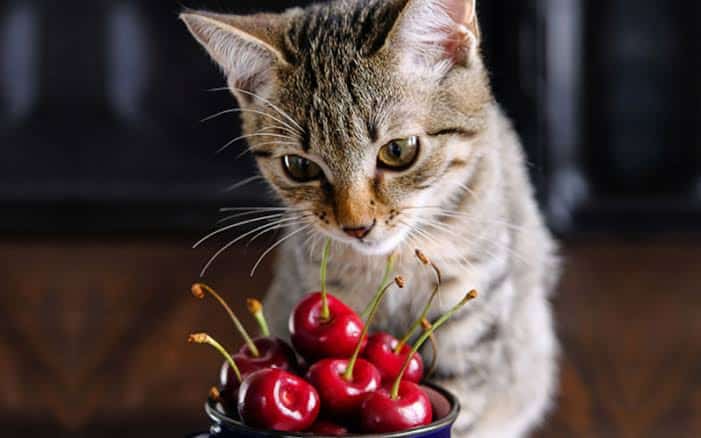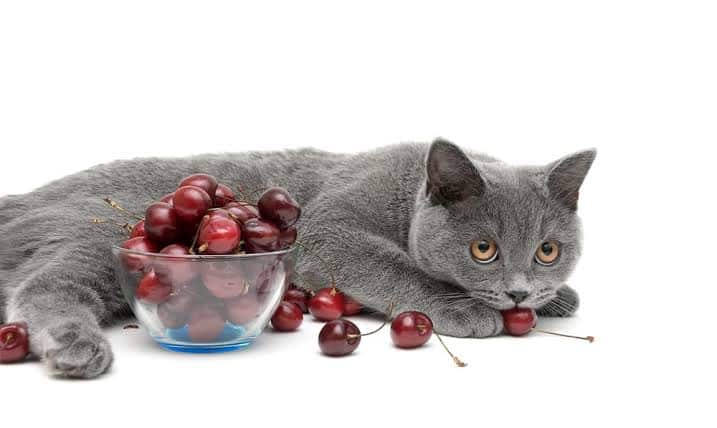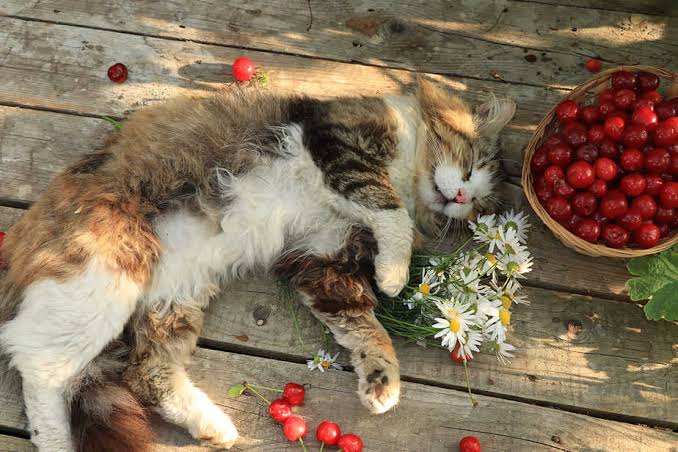As cat owners, we’re often cautious about what foods we offer our feline companions, and cherries are no exception. In this article, we’ll seek to answer the question: “Can cats eat cherries?”. We shall also discuss; Overview Of Cherries, Potential Benefits Of Cherries To Cats, Potential Risks Of Cherries To Cats, Safe Alternatives To Cherries For Cats, etc.
Understanding whether cherries are safe for cats is crucial for responsible pet ownership. While cherries offer various potential health benefits for humans, including antioxidants and vitamins, it’s essential to examine how they may affect our beloved feline friends.
Join us as we explore the safety of cherries for cats, discuss potential risks and considerations, and provide guidance on whether cherries can be incorporated into a cat’s diet. Let’s unravel the mysteries surrounding cherries and their suitability for our furry companions.
Overview Of Cherries
Cherries are delightful fruits that belong to the genus Prunus and are enjoyed worldwide for their sweet and tangy flavor. They come in various colors, including red, yellow, and dark purple, and are available in both sweet and tart varieties. Cherries are not only delicious but also packed with nutrients, making them a popular choice in human cuisine.
Recommended: Are Poinsettias Poisonous to Cats?

Common Varieties Of Cherries
Cherries come in a variety of types, each with its own unique flavor profile and culinary uses. Here are some common varieties of cherries:
1. Bing Cherries:
They are popular and sweet. Also, they have a deep red color and a rich, sweet flavor. Bing cherries are often enjoyed fresh as a snack or used in desserts like pies and cobblers.
2. Rainier Cherries:
Rainier cherries are known for their distinctive yellow-red color and sweet, delicate flavor. They have a higher sugar content than other cherry varieties, making them exceptionally sweet and juicy. Rainier cherries are prized for their flavor and are often eaten fresh or used in desserts and fruit salads.
3. Montmorency Cherries:
Montmorency cherries are a type of tart cherry known for their bright red color and tangy flavor. They are commonly used in cooking and baking due to their tartness, which adds a unique flavor to pies, jams, and sauces. Montmorency cherries are also popular for their potential health benefits, particularly for supporting joint health and reducing inflammation.
4. Black Cherries:
Black cherries, also known as sweet black cherries, have a dark purple-black color and a rich, sweet flavor. They are less common than other cherry varieties but are prized for their intense flavor and juiciness. Black cherries are often eaten fresh or used in desserts, jams, and beverages.
5. Queen Anne Cherries:
Queen Anne cherries are a sweet cherry variety with a light red color and a mild, sweet flavor. They are smaller and softer than other cherry varieties, making them ideal for snacking or incorporating into baked goods like tarts and cakes.
6.Sour Cherries:
Sour cherries, also known as tart cherries, are smaller and less sweet than sweet cherries. They have a bright red color and a tangy, acidic flavor. Sour cherries are commonly used in cooking and baking, particularly in pies, jams, and sauces, where their tartness adds depth and complexity to dishes.
Additional Information
These are just a few of the many varieties of cherries available. Each type of cherry has its own unique characteristics and flavor profile, making them versatile ingredients in a wide range of culinary applications. Whether enjoyed fresh as a snack or used in cooking and baking, cherries add a burst of flavor and color to any dish.
Nutritional Profile Of Cherries
Cherries are not only delicious but also packed with essential nutrients that offer various health benefits. Here’s a closer look at the nutritional profile of cherries:
Vitamins And Minerals
Cherries are rich in several vitamins and minerals, including:
Vitamin C: Cherries are a good source of vitamin C, an antioxidant that supports immune function and promotes skin health.
Potassium: Cherries contain potassium, an essential mineral that helps regulate blood pressure and maintain proper muscle and nerve function.
Vitamin A: Some varieties of cherries, such as Rainier cherries, are high in vitamin A, which is important for vision and immune health.
Vitamin K: Cherries also provide vitamin K, which plays a role in blood clotting and bone health.
Antioxidants
Cherries are loaded with antioxidants, including:
Anthocyanins: These pigments give cherries their vibrant red, purple, or yellow color and have been linked to various health benefits, including reduced inflammation and improved heart health.
Flavonoids: Cherries contain flavonoids such as quercetin and kaempferol, which have antioxidant and anti-inflammatory properties.
Polyphenols: Cherries are rich in polyphenols, which may help protect against chronic diseases such as cancer and heart disease by neutralizing free radicals in the body.
Fiber
Cherries are a good source of dietary fiber, which is important for digestive health and may help prevent constipation and promote regularity. Fiber also helps control blood sugar levels and supports heart health by lowering cholesterol levels.
Low In Calories And Fat
Cherries are relatively low in calories and fat, making them a healthy option for those watching their weight. One cup of cherries contains approximately 90 calories and less than 1 gram of fat, making them a satisfying and guilt-free snack.
Hydration
Cherries have a high water content, which helps keep you hydrated and supports overall health. Staying hydrated is essential for maintaining proper bodily functions, including temperature regulation, nutrient transport, and waste elimination.

Common Uses Of Cherries In Human Cuisine
Cherries are incredibly versatile and can be enjoyed in a variety of ways in human cuisine. Some common uses of cherries include:
- Fresh Eating: Sweet cherries are delicious eaten fresh as a snack or added to fruit salads for a burst of flavor and sweetness.
- Baking: Cherries are a popular ingredient in baking and are commonly used in pies, cobblers, muffins, and cakes. Tart cherries, in particular, lend a tangy flavor to baked goods and pair well with other fruits, such as apples and berries.
- Preserves and Jams: Cherries can be cooked down into preserves, jams, and sauces, which can be spread on toast, used as toppings for desserts, or incorporated into savory dishes.
- Desserts: Cherries are a classic topping for ice cream sundaes, yogurt parfaits, and cheesecakes. They can also be used to make sorbets, fruit crisps, and compotes.
- Beverages: Cherries are used to flavor a variety of beverages, including cherry juice, smoothies, cocktails, and flavored water. Tart cherry juice, in particular, has gained popularity for its potential health benefits and tart flavor.
Recommended: Is Bamboo Toxic to Cats?
Potential Benefits Of Cherries To Cats
It’s essential to consider whether Cherries offer any potential benefits for our Cats. While there is limited scientific research specifically on the effects of cherries on cats, some potential benefits may apply:
Antioxidant Properties
Cherries are rich in antioxidants, such as anthocyanins and flavonoids, which help protect cells from damage caused by free radicals. In cats, antioxidants may support overall health and may help reduce the risk of chronic diseases.
Hydration
Cherries have a high water content, which can help keep cats hydrated, especially if they are not drinking enough water from their bowl. Adequate hydration is essential for cats’ overall health, supporting proper kidney function and digestion.
Vitamins And Minerals
Cherries contain vitamins and minerals, such as vitamin C, potassium, and vitamin A, which are important for cats’ health. While cats typically obtain these nutrients from their regular cat food, the additional vitamins and minerals in cherries may contribute to their overall well-being.
Fiber Content
Cherries are a good source of dietary fiber, which may help support cats’ digestive health by promoting regular bowel movements and preventing constipation. Fiber can also help cats feel full and satisfied, which may aid in weight management.
Anti-inflammatory Effects
Some compounds found in cherries, such as anthocyanins and quercetin, have anti-inflammatory properties. In cats, these compounds may help reduce inflammation associated with conditions such as arthritis or inflammatory bowel disease.
Mental Stimulation
Offering cherries as an occasional treat can provide cats with mental stimulation and enrichment. Cats enjoy exploring new textures and flavors, and offering them a small piece of cherry as a treat can provide them with sensory stimulation and enrichment.

Potential Risks Of Cherries To Cats
Here are some potential risks of cherries to cats:
Toxicity
Cherries, particularly the pits and stems, contain compounds such as cyanide that can be toxic to cats if ingested in large quantities. Cyanide inhibits the body’s ability to use oxygen properly, leading to respiratory distress, lethargy, and even death in severe cases. Additionally, cherry pits can pose a choking hazard or cause intestinal blockages if swallowed whole.
Digestive Upset
Cherries contain natural sugars and fiber, which may cause digestive upset in some cats, especially if they consume large amounts. Symptoms of digestive upset may include vomiting, diarrhea, abdominal pain, and decreased appetite. Cats with sensitive stomachs or gastrointestinal issues may be more prone to experiencing digestive upset after eating cherries.
Allergic Reactions
Some cats may be allergic to cherries or develop sensitivities to certain compounds found in cherries. Allergic reactions can manifest as itching, redness, swelling, or hives on the skin, as well as gastrointestinal symptoms like vomiting and diarrhea. If you suspect your cat is having an allergic reaction to cherries, discontinue feeding them immediately and consult with your veterinarian.
Obesity And Weight Gain
Cherries are relatively high in natural sugars and calories, which can contribute to obesity and weight gain in cats if consumed in excess. Overfeeding cherries as treats or snacks can lead to an imbalance in your cat’s diet and may contribute to health issues such as diabetes and joint problems.
Choking Hazard
The pits and stems of cherries can pose a choking hazard for cats, especially if they attempt to swallow them whole. Cats may also play with cherry pits or stems, increasing the risk of choking or injury.
Gastrointestinal Blockages
Swallowing cherry pits or large pieces of cherry stems can lead to gastrointestinal blockages in cats, which require immediate veterinary attention. Symptoms of gastrointestinal blockages may include vomiting, diarrhea, abdominal pain, lethargy, and loss of appetite.
Recommended: Melatonin for Cats

Safe Alternatives To Cherries For Cats
While cherries may not be suitable for cats due to potential risks, there are plenty of safe and nutritious alternatives that you can offer to your feline friend. Here are some options to consider:
1. Blueberries
Blueberries are packed with antioxidants, vitamins, and fiber, making them a healthy and safe treat for cats. They are low in calories and sugar, making them an excellent option for weight-conscious cats. Offer blueberries as a snack or mix them into your cat’s food for added flavor and nutrition.
2. Strawberries
Strawberries are another fruit that cats can safely enjoy in moderation. They are high in vitamin C and fiber, which can support digestive health and immune function. Remove the stems and hulls before offering strawberries to your cat, and offer them in small, bite-sized pieces.
3. Bananas
Bananas are a great source of potassium, vitamins, and fiber, making them a nutritious snack for cats. Offer small pieces of ripe banana as an occasional treat, but be mindful of the sugar content. Too much banana can cause digestive upset in some cats, so offer them sparingly.
4. Cooked Vegetables
Cooked vegetables such as green beans, peas, and carrots can be safe and nutritious options for cats. These vegetables are low in calories and can provide vitamins, minerals, and fiber. Steam or boil vegetables until they are soft, and offer them as a healthy snack or mix them into your cat’s food.
5. Catnip
Catnip is a safe and enjoyable herb that many cats love. It’s known to have a calming effect on cats and can provide mental stimulation and enrichment. Offer dried catnip as a treat or sprinkle it on your cat’s toys or scratching posts for added fun.
Can Cats Safely Consume Cherries?
Cherries may be safe for humans, they are not recommended for cats due to potential toxicity, digestive upset, choking hazards, and allergic reactions. It’s best to err on the side of caution and avoid feeding cherries to your cat altogether.
Instead, opt for safer alternatives that are specifically formulated for feline dietary needs. If you have any concerns about your cat’s diet or health, consult with your veterinarian for personalized advice and guidance.
FAQs About Cats And Cherries
Are Cherry Pits Safe For Cats?
No, cherry pits contain compounds such as cyanide, which can be toxic to cats if ingested. It’s essential to remove pits and stems from cherries before offering them to your cat.
What Should I Do If My Cat Eats Cherries?
If your cat consumes cherries, especially cherry pits or stems, monitor them closely for any signs of toxicity, digestive upset, or choking. Then, inform a veterinarian on the development.
Are There Any Benefits To Feeding Cherries To Cats?
While cherries contain some nutrients beneficial to humans, they are not essential to a cat’s diet and can pose risks. It’s best to offer safer alternatives that are specifically formulated for feline dietary needs.
Can Cats Eat Other Fruits Besides Cherries?
Some fruits, such as blueberries, strawberries, and bananas, may be safe for cats to eat in moderation. However, always research and consult with your veterinarian before offering new foods to your cat.
How Do I Safely Introduce New Foods To My Cat’s Diet?
When introducing new foods to your cat, start with small amounts and monitor them for any adverse reactions. Gradually increase the amount if tolerated, but always offer new foods in moderation and as part of a balanced diet.
Are There Any Fruits That Are Toxic To Cats?
Of course! grapes and raisins fall under this category. Always research and consult with your veterinarian before offering any new foods to your cat.
Recommended: Are Peonies Poisonous to Cats?
Conclusion
It’s essential to prioritize your cat’s health and well-being by avoiding feeding them cherries altogether. Instead, opt for safer alternatives such as blueberries, strawberries, and bananas, which can provide similar nutritional benefits without the risks associated with cherries.
If you suspect your cat has ingested cherries or is experiencing any symptoms of toxicity, digestive upset, or choking, contact your veterinarian immediately for guidance and treatment. Remember to always research and consult with your veterinarian before introducing any new foods or treats into your cat’s diet.
